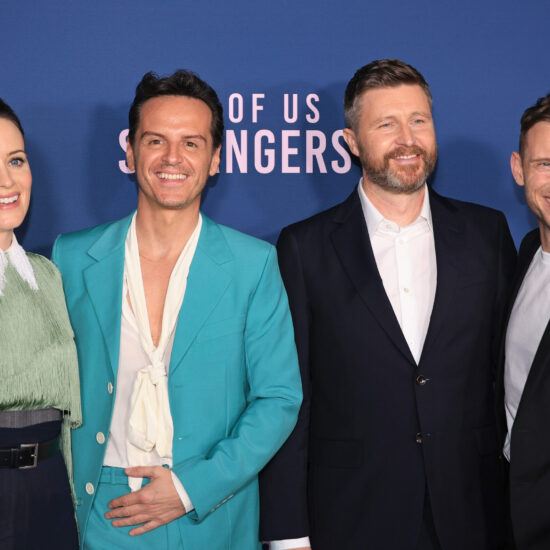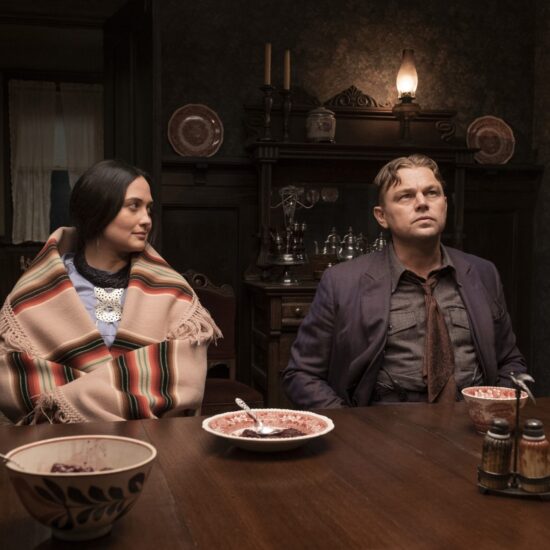
A smirking (and heavily fictionalized) rise-and-fall story of American greed that aspires to do for fentanyl what “The Wolf of Wall Street” did for Steve Madden, Netflix’s seriocomic “Pain Hustlers” is the first magic and/or Tarzan-free movie that “Fantastic Beasts and Where to Find Them” maestro David Yates has directed since 1998’s “The Tichborne Clarinet.” On paper, that sound like a combination of tone, subject matter, and storyteller that probably shouldn’t work. On screen, it absolutely doesn’t.
The problem with “Pain Hustlers” isn’t that its approach to the opioid crisis feels glib (it does), or that Yates keeps digitally inserting Dobby the elf into scenes of pharmaceutical sales reps pushing their latest drugs on morally flexible doctors (he doesn’t), but rather that the film takes a golden opportunity to explore the desperate personal choices that compounded into one of our most dire national crises, and wastes it on the same kind of superficial crime drama that’s already been made about myriad other “victimless crimes” and get-rich-quick schemes just like it.
Long on voiceovers, short on specificity, and so high on the generic-brand Scorsese of it all that it glosses right over the gray areas that make its characters so tragic, Yates’ film is more focused on being easy to swallow than it is on meaningfully addressing the source of the pain.
Ironically, the strongest thing about this movie is the fictional character that Wells Tower’s script invented out of whole cloth in order to make its source material — Evan Hughes’ 2022 book, “Pain Hustlers: Crime and Punishment at an Opioid Startup” — more digestible. A convincingly hard-nosed and tenacious Emily Blunt stars as Liza Drake, a single mom who’s struggling to make ends meet as a stripper in Florida circa 2011. It’s all sad lap dances and spectacularly disguising her British accent until the day a skeezy pharma sales rep named Pete Brenner (Chris Evans, desperately trying to mine a three-dimensional character from a role that never gets more complicated than “Boston grifter”), stumbles into her club and gives her a job opportunity in lieu of a tip.
Faster than you can say “remember when that movie ‘Love & Other Drugs’ kinda tried this as a rom-com?,” Liza is visiting the most unscrupulous doctors in the state — personified by Brian d’Arcy James’ slimy Dr. Lydell — and prevailing upon them to prescribe Zanna Pharmaceuticals’ new wonder drug Lonafen. So far as our cash-strapped heroine is concerned, her lucrative new gig almost sounds like a public service: Why should mouth cancer patients suffering from tremendous amounts of pain have to suck on a slow-acting fentanyl lollipop that causes lesions when they could be sublingually delivering the stuff into their bloodstream 10 times faster just by sticking it under their tongues? After all, billionaire Zanna CEO Dr. Jack Neel (Andy Garcia in hushed germaphobe mode), who lost his own wife to cancer, paid for a clinical study that suggested that the drug posed no risk of addiction to an overwhelming percentage of patients.
But if creating medicine is an exact science, practicing it is open to interpretation, and that’s where the trouble starts. Like so many businesses under capitalism, Zanna is convinced that it has to grow in order to survive; it treats cancer with a cancerous mentality. At first, that means creating a “speaker program” designed to get susceptible doctors on the payroll, but greed begets more greed, and it’s only a matter of time before Liza gets the go-ahead to begin promoting Lonafen for off-label uses. Have a headache? Try some fentanyl. Stubbed your toe? Take 10 milligrams and call back in the morning if you can still feel your face.
On some level, Liza knows that she’s breaking the law, but Pete likens it to driving 67 M.P.H. in a 65 M.P.H. zone. It’s a compelling analogy, and one that Liza clings to once her daughter is diagnosed with an epileptic condition that may require major (read: pricey) brain surgery. “Pain Hustlers” never completely lets its heroine off the hook, but it’s clear that the American healthcare system is the real villain here. For all its foolishness, Yates’ film knows that we live in a terminally ill society — a society where the money that people make is the ultimate painkiller that saves them from having to feel the ill-effects firsthand.
To the limited extent that “Pain Hustlers” works, it does so by focusing on the human aspect of profiting from addiction and misery. And to the limited extent that it makes Liza a compelling character, it does so by focusing on her desire to feel safe — not to get rich, but rather to lessen the nerve-shredding insecurity of having to care for her daughter and her judgmental mother (a solid Catherine O’Hara, whose casting reflects the movie’s unrealized comic ambitions). Those relationships aren’t poorly served by a script that shares Zanna Pharmaceuticals’ overeagerness to keep getting bigger and bigger at the expense of getting anything right, but Blunt is able to sell Liza’s self-conflicted morality just as effectively as Liza is able to sell Lonafen. But she eventually is forced to ask herself the same question that so many of her victims are never clear-headed enough to ask themselves: At what point does pain relief start to hurt?
It’s a question that “Pain Hustlers” isn’t much interested in answering, as the movie would rather ride the highs of Zanna’s initial success — and white-knuckle its way through the company’s reversal of fortune — than slow down long enough to clock what it all means. Self-delusion becomes a constant refrain (“I did it for the right reasons,” Liza insists during the hacky faux interviews that bookend the film), and scammy posturing stands in for character growth during almost every scene (“You sell what’s in your bag,” Pete offers as both a philosophy and an excuse), but all of this stuff is so over-the-counter that it might as well be about any racket in American history.
Our intrinsic greed is no doubt part of the point, but stories can only be so “timeless” before they no longer become worth telling, and the repeated use of Semisonic’s “Closing Time” is not, it turns out, a sufficient stand-in for mining less hackneyed material from scenes of drug pushers getting their comeuppance, least of all in a film that lacks both the stomach to look closer at the loss and heartache its characters left behind, and the vision required to dramatize how they managed to look the other way. “Pain Hustlers” is well aware that it’s telling a tale as old as America itself, but that ultimately leaves the film with even less of an excuse for not telling it better.
Grade: C-
“Pain Hustlers” premiered at the 2023 Toronto International Film Festival. Netflix will release it in select theaters on Friday, October 20, before making it available to stream on Netflix starting Friday, October 27.















